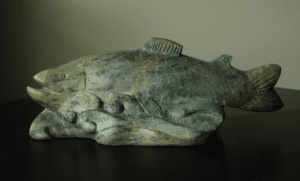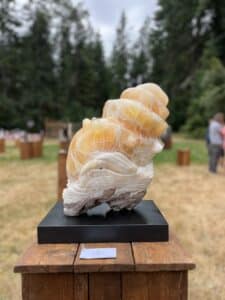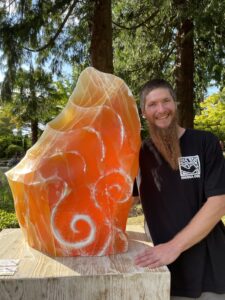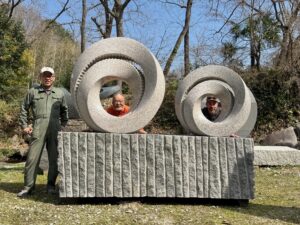
Home » Carve » Experience » Intermediate Experience » Building a Sculpture Shipping Crate
If you are entering art competitions with your sculptures, and need to ship them to the exhibit or to customers, you need a sturdy, reusable crate. These foam lined crates will protect your precious sculptures. Remember that old Sampsonite commercial? Gorillas handle the freight. The following instructions will take a little of your time, but trust me, it is well worth it.

Materials
Plywood, Use a middle grade, not the splintery stuff. I recommend using 3/8 or ½ inch for smaller crates, those up to 15 X 15 X 24 inches. Use ½ to ¾ inch plywood for larger crates. Also consider the weight of your sculpture. The heavier your sculpture, the sturdier the crate needs to be.
1. Cut Plywood
You will need a full sheet of half-inch plywood for this 2 X 2 X 3 foot crate.
You can cut your own pieces, but the big stores like Lowes and Home Depot will also do it for a dollar or two per cut.
2. Lay Out Plwood Pieces
Allow two or three inches between the sculpture and the plywood, including the bottom for the dense Styrofoam.
The walls will fasten around the bottom piece.
Mark A, B, C, D on the sides and their corresponding edges on the bottom so you and the receiver will know which sides go where when reassembling the crate.
3. Handles
For handles on small crates, use the cupboard door handles, make sure to fasten them from inside the crate.
For large, heavy crates, cut hand holds in the plywood sides. After drawing the hole outline, drill a hole at one end for the jig saw blade and cut out the hand hold. Make it large enough for a gloved hand. Sand any rough edges.
4. Screw Sides Together
Using a bit a size smaller in diameter than the screw, drill holes the length of the screws into the upper corner and into the adjoining piece. Set the first screw, but not too tight. Then align the bottom and drill and screw that.
Repeat until the crate is assembled at all the corners. Now drill and set screws between the corners, about two or three inches apart.
5. Surround Sculpture with Foam
Visualize that you are making a Styrofoam mold around your sculpture. Note: If you are not sure how much Great Stuff foam expands (about 5 times), squirt some onto a piece of paper, let it dry and use this to estimate how much foam to spray into the plastic garbage bags.
Block off deep cuts with rags taped onto the sculpture. Otherwise, the dried foam cushioning will not pull away easily. Snug is good.
With the crate screwed together, set your sculpture onto the fitted Styrofoam bottom piece. Gently push your sculpture into the Styrofoam a little to allow for settling. Put a plastic trash bag down along the sculpture. Do not get the foam on your sculpture!
With rubber gloves on, spray the foam into the bag starting at the bottom. Screw the top on if you want the foam to flatten against the top. Let dry. You can always add more. If it expanded too much after drying, just trim it off.
Repeat this procedure on the other side if sculpture is fairly flat or a simple design. Make three or four sections if more complicated. Be very careful when doing the last bag or top bag if you have one. Too much expanding foam can break open the crate.
6. How to Un-Pack
To remove sculpture from the crate, unscrew the top and sides. Mark each foam section with the corresponding sides: A, B, C, D and top.
Anyone repacking will know which foam goes where. Gently pull each foam section off. Each bag will have formed perfectly around your sculpture for a secure fit. Leave the bags on the foam, but trim extra plastic off.
Note. Be sure to write the unpacking and repacking directions and glue to the under side of the lid. If your sculpture sells or is shipped to a client, request the return of the crate for using again.








We need some kind of descriptive text here.